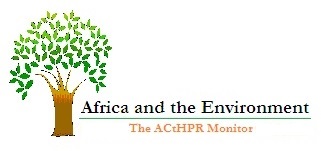
I am very pleased to welcome Moustapha Fall, doctoral student at the University of Nantes (France), to the Monitor with this guest post analysing two important environmental cases before the ECOWAS and EACJ. I hope our readers enjoy this piece, part of our occasional series on Africa and the environment. Comments can be send to Moustapha via contact@acthprmonitor.org- OW
- Introduction
This post analyses the way that sub-regional African courts, namely the Court of Justice for the Economic Community of West African States (ECOWAS Court) and East African Court of Justice (EACJ), interpret legal instruments on human rights and community law in order to ensure the protection of the environment. I believe that both the ECOWAS Court and EACJ have moved towards what has been termed ‘judicial environmentalism’ in their recent jurisprudence and have given effect to substantive environmental rights in Africa. I will examine the ECOWAS Court’s ruling in the SERAP case and the EACJ’s holding in the Serengeti case, both of which have shown that safeguarding human rights and preserving the environment are complementary objectives that sub-regional courts are willing to protect.
- SERAP v. Nigeria (2012)
In the SERAP case, ECOWAS Court for the first time gave genuine protection to the environment in the Niger Delta region.
(i) Facts of the Case

The Applicants in this case were the Socio-Economic Rights and Accountability Project (SERAP), a non-governmental organization who focus on damage from oil spills and other human rights violations caused by oil operations conducted on land and offshore in the Niger Delta region. For decades the Niger Delta region has suffered from oil spills which destroy the area and deny the people living there the basic necessities of life such as adequate access to clean water, food and a healthy environment in which to live.
The Applicants alleged that the industrial operations of the Shell Petroleum Development Company (SPDC) were responsible for much of the oil spillage in the Niger Delta. They alleged that these spillages led to a violation of people in the Niger Delta right to health and an adequate standard of living and argued that the economic and social development of the people of the Niger Delta had been badly affected, as Nigeria had failed to enforce laws and regulations to protect the environment. In particular, the Applicants alleged violations of articles 1, 5, 9, 14, 17, 21, 24 of the African Charter on Human and Peoples’ Rights (ACHPR), Articles 1, 2 and 6 of the International Covenant on Economic Social and Cultural Rights (ICESCR), Article 12-2 (b) of the International Covenant on Civil Political Rights (ICCPR) and Article 15 of the Universal Declaration of Human Rights (UDHR).
(ii) Decision of the Court
In its consideration of the case, one of the main questions that the ECOWAS Court had to answer was whether Nigeria had violated the right to a ‘satisfactory’ environment provided for under Article 24 of the ACHPR.
To determine the state responsibility of Nigeria, the ECOWAS Court made the link between Article 24 and Article 1 of the ACHPR, which provides that ‘The member states of the Organization of African Unity parties to the present Charter shall recognize the rights, duties and freedoms enshrined in this Charter and shall undertake to adopt legislative or other measures to give effect to them‘. The Court declared that Article 24 ‘requires every state to take every measure to maintain the quality of the environment…such as it may satisfy the human beings who live there, and enhance their sustainable development’. The Court then reasoned that the state obligation under Article 24 of the ACHPR is both ‘an obligation of attitude and an obligation of result’.
The Court went on to find that the Nigerian government had failed to protect the Niger Delta and its people from oil operations. It found that Nigeria had not taken measures to prevent environmental damage and interestingly failed to hold the oil companies responsible for environmental degradations. The ECOWAS Court therefore ordered Nigeria to ‘take all effective measures to ensure restoration of the environment of the Niger Delta by oil spills from Shell and other companies and to take all effective measures to prevent the occurrence of damage to the environment’. The ECOWAS Court took a broad view of environmental protection and referred in its judgement to the definition provided by the International Court of justice (ICJ) who expressed in the Legality of the threat or use of nuclear arms advisory opinion that the environment ‘is not an abstraction but represents the living space, the quality of life and the very health of human being, including generations unborn‘. The ECOWAS Court subsequently determined that the ‘environment is essential to every human being and the quality of human life depends on the quality of the environment‘. The ECOWAS Court finally declared that Nigeria failed in its duty to maintain a satisfactory environment favourable to the development of the Niger Delta region and also failed to enact effective laws and establish effective institutions to regulate the activities of companies. The court also held that Nigeria had failed to enforce environmental standards, thereby violating the rights of the people in the region.
The collective approach of the ECOWAS Court was very original in considering that ‘Article 24 requires every State to take every measure to maintain the quality of the environment understood as an integrated whole, such that the state of the environment may satisfy the human beings who live there‘. With this decision, the ECOWAS Court recognized the right to a healthy environment as provided for by the ACHPR.
- ANAW v. The Attorney General of Tanzania (2014)
The central dispute in the ANAW case concerned the decision of the Tanzanian government to build a road across the Serengeti National Park. In this case, the EACJ sought to enforce the environmental obligations states have agreed to under the East African Treaty (EAT).

(i) Facts of the Case
The Applicants in this case were the African Network for Animal Welfare (ANAW), a non-profit environmental conservation organization based in Kenya. In 2010, Tanzania released plans to build a 53 kilometre bitumen road across the Serengeti National Park for use by the general public. ANAW claimed that the construction of the road would have a negative impact on animal behaviour and the quality of life of the citizens living in the vicinity. ANAW sought, inter alia, a declaration that the construction of the road across the Serengeti would be unlawful and in violation of several provisions of the EAT. They also sought a permanent injunction, restraining Tanzania from maintaining any road or highway across any part of the Serengeti National Park. The Applicants argued that Tanzania had violated its obligations in respect of the Serengeti, which had been declared a World Heritage Property of “Outstanding value” according to United Nations Educational, scientific and cultural organization (UNESCO).
(ii) Decision of the Court
Tanzania initially challenged the jurisdiction of the EACJ to hear the case, arguing that as the environmental protocol on which the Applicants based their claim had not yet been enacted, the Court had no jurisdiction to hear the case. The Court however, dispensed with this jurisdictional challenge, arguing that whilst the specific protocol at issue may not have been ratified by Tanzania, the EAT had been ratified, and certain provisions of the EAT made it clear that the environmental provisions of the protocol would apply to State parties of the treaty irrespective of specific ratification of the Protocol. The Court therefore dismissed this ground of objection.
The EACJ then went on to analyse what it considered the key issue which was whether the proposed action infringed the provisions of the EAT itself. In this regard, the EACJ held that the proposal to construct a road across the Serengeti National Park was unlawful and infringed articles 5 (3) (c), 8 (1) (c), 111 (2) and 114 of the EAT which require partner states to conserve, protect and co-operate in the management of natural resources and the environment. According to the EACJ ‘there is no doubt that if implemented the road project initially would violate the Treaty’. The EACJ was convinced by the negative consequences on the environment of the proposed action and therefore ordered an injunction restraining Tanzania from operationalizing the proposal.
Tanzania appealed the decision of the First Instance Court to the Court of Appeal however, the Court of Appeal upheld the decision, holding that partner states must respect their environmental obligations and re-affirming that the EACJ had the power to grant permanent injunctions against sovereign partner States.
- Conclusion
To conclude, it is clear that in ordering Nigeria to take all effective measures to ensure the restoration of the Niger Delta environment the ECOWAS Court illustrated its commitment to protect the right to environment in West Africa. Similarly, the EACJ demonstrated its ability to interpret the EAT in order to protect the environment. With these decisions both courts have expressed their commitment to the protection of environmental rights in the Western and East African regions. These decisions have established valuable precedents through which individuals and NGOs can bring actions against governments in relation to environmental matters in the future.
